Prefab Container Building Innovation Meets Workforce Needs: Lida Group’s Efficient Container Labor Camp Deployments
2025-Sep-16 14:46:43
By Admin
1. Introduction
In the dynamic landscape of global industrial and infrastructure development, the demand for reliable, comfortable, and efficient workforce accommodation has never been more pressing. Industries such as construction, mining, energy, and logistics rely heavily on large teams of workers who often operate in remote or temporary project sites—locations where traditional brick-and-mortar housing is either impractical, time-consuming to build, or economically unviable. For decades, these workers have faced substandard living conditions: cramped spaces, inadequate sanitation, poor insulation against harsh weather, and limited access to basic amenities. These challenges not only compromise workers’ physical and mental well-being but also hinder productivity, increase turnover rates, and create operational bottlenecks for project managers.
Against this backdrop, prefabricated (prefab) container buildings have emerged as a transformative solution, and Lida Group—a global leader in prefab construction innovation—has been at the forefront of redefining workforce accommodation. By leveraging the inherent advantages of container-based design—durability, modularity, and rapid deployment—Lida Group has developed a range of worker camp solutions that directly address the unmet needs of modern workforces. Unlike generic prefab structures, Lida Group’s container camps are engineered with a deep understanding of workforce dynamics: they prioritize comfort, safety, sustainability, and adaptability, ensuring that workers feel valued while project teams benefit from reduced costs and faster setup times.
This article explores how Lida Group’s prefab container building innovation aligns with the evolving needs of today’s workforce. It examines the core challenges of traditional worker accommodation, the unique features of Lida Group’s container camp solutions, real-world deployment case studies across diverse industries, and the broader impact of these innovations on industry standards and worker welfare. Finally, it concludes with insights into the future of prefab container camps and Lida Group’s role in shaping that future.
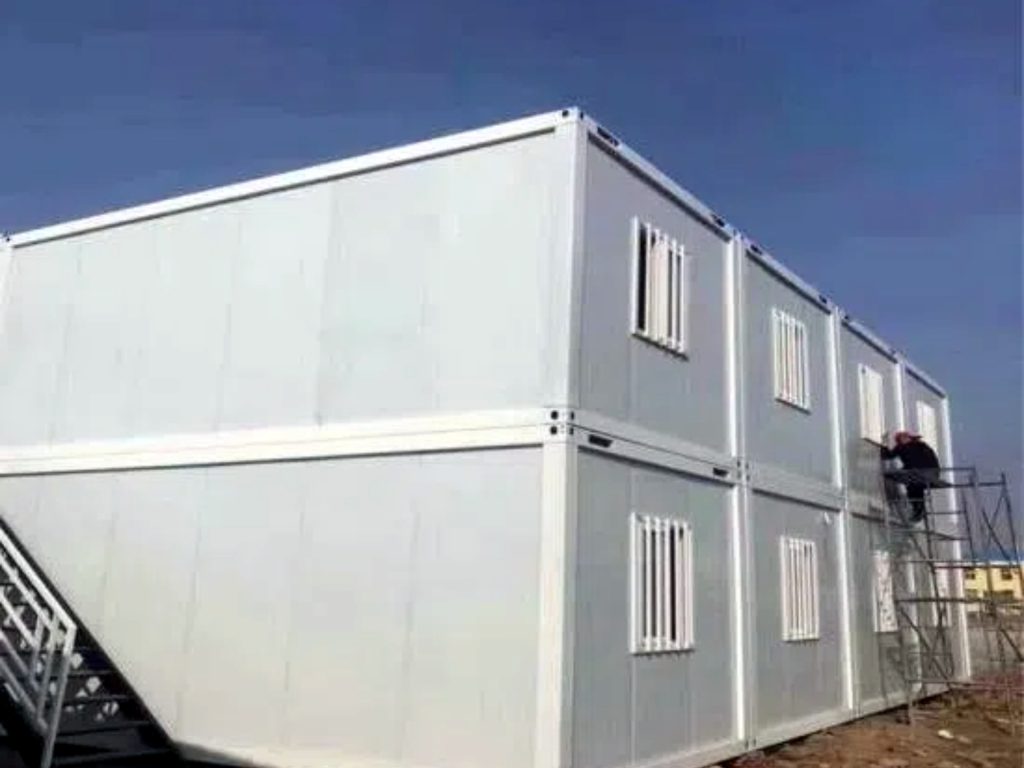
2. The Evolving Needs of Modern Workforces: Why Traditional Accommodation Falls Short
To appreciate the value of Lida Group’s container camp innovations, it is first critical to understand the changing expectations and needs of today’s workforce—and why traditional accommodation models are no longer sufficient.
2.1 From “Basic Shelter” to “Holistic Well-Being”
Gone are the days when workers accepted cramped tents or poorly built sheds as adequate accommodation. Today’s workforce—comprising diverse age groups, including millennials and Gen Z—views decent living conditions as a fundamental right, not a luxury. Workers now expect accommodation that supports their holistic well-being: private or semi-private spaces for rest, clean sanitation facilities, access to recreational areas, and amenities that promote physical and mental health (such as gyms or outdoor spaces). Traditional accommodation, however, often fails on these fronts. For example, a 2023 survey of construction workers in remote sites found that 68% reported feeling “chronically fatigued” due to overcrowded dormitories, while 57% cited “unsanitary bathrooms” as a major source of stress. These issues not only harm worker morale but also lead to higher absenteeism: the same survey found that workers in substandard accommodation missed an average of 4.2 workdays per month, compared to 1.8 days for those in quality housing.
2.2 Adaptability to Dynamic Workforce Sizes
Modern projects—whether a six-month highway construction job or a three-year mining operation—often experience fluctuations in workforce size. A project may start with 50 workers, scale to 300 during peak construction, and shrink back to 100 during the final phase. Traditional accommodation, which is fixed in size and design, struggles to adapt to these changes. Building extra permanent structures for peak periods wastes resources, while insufficient space during surges forces workers to share overcrowded rooms. This inflexibility creates logistical headaches for project managers and erodes worker satisfaction.
2.3 Resilience Against Harsh Environments
Many workforce sites are located in extreme climates: desert regions with scorching daytime temperatures, mountainous areas with freezing winters and heavy snowfall, or coastal zones prone to high humidity and tropical storms. Traditional accommodation—such as canvas tents or lightweight prefab sheds—lacks the structural integrity and insulation to withstand these conditions. In desert sites, tents can reach internal temperatures of 50°C (122°F) during the day, making rest impossible. In mountainous areas, poorly insulated sheds lead to frozen pipes and cold-related illnesses. These environmental vulnerabilities not only risk worker health but also disrupt project timelines: a 2022 report by the Global Infrastructure Initiative found that weather-related accommodation failures delayed 32% of remote construction projects by an average of 6 weeks.
2.4 Sustainability as a Non-Negotiable
Today’s workforce—and the companies that employ them—are increasingly focused on sustainability. Workers, particularly younger generations, want to be associated with brands that prioritize environmental responsibility, while companies face pressure from stakeholders to reduce their carbon footprint. Traditional accommodation fails here too: it often relies on non-recyclable materials, generates excessive construction waste (up to 20% of all on-site waste, according to the World Green Building Council), and has high energy consumption due to poor insulation. In contrast, prefab container buildings offer a more sustainable alternative—but only if designed with eco-consciousness in mind.
2.5 Speed of Deployment
In fast-paced industries like construction and energy, time is money. Delays in setting up worker accommodation can push back project start dates, leading to increased costs and missed deadlines. Traditional accommodation requires on-site construction: sourcing materials, hiring local labor, and navigating permitting processes—all of which can take months. For example, building a 100-person traditional worker camp in a remote mining area can take up to 12 weeks. This slow deployment is no longer acceptable in an era where projects demand rapid mobilization.
These gaps—between workforce needs and traditional accommodation capabilities—have created a critical opportunity for innovation. Lida Group’s prefab container worker camps are specifically designed to fill this gap, combining modularity, durability, sustainability, and worker-centric design to meet the demands of modern projects.
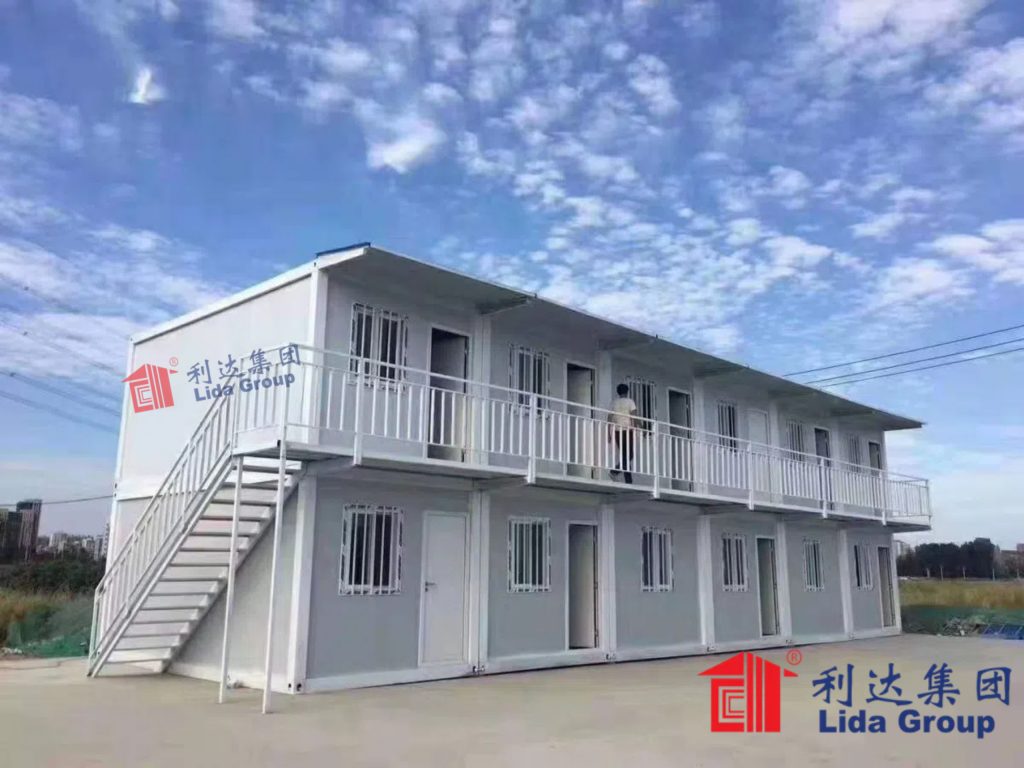
3. Lida Group’s Prefab Container Innovation: Core Features That Meet Workforce Needs
Lida Group’s success in redefining worker accommodation stems from its commitment to innovation. The company’s container camps are not just “modified shipping containers”—they are engineered systems that integrate advanced materials, modular design, and smart features to address the specific pain points of workforce living. Below are the core innovations that make Lida Group’s solutions stand out.
3.1 Modular Design for Adaptable Capacity
At the heart of Lida Group’s innovation is its modular container system. Each container unit is a self-contained module that can be easily stacked, connected, or reconfigured to match workforce size. For example:
- A single 20-foot container can serve as a 2-person dormitory room with built-in beds, storage, and a small workspace.
- Two 40-foot containers can be connected side-by-side to create a communal dining hall or recreation room.
- Multiple modules can be stacked vertically (up to 3 levels) to create a 300-person camp in a small footprint—critical for sites with limited space.
This modularity means that project managers can scale accommodation up or down in days, not weeks. If a project’s workforce grows from 100 to 250, Lida Group can deliver additional modules and integrate them into the existing camp within 72 hours. Conversely, if the workforce shrinks, unused modules can be disassembled and relocated to another site—reducing waste and saving costs. This adaptability directly addresses the dynamic workforce size challenge faced by modern projects.
3.2 Durable, Weather-Resilient Construction
Lida Group’s containers are built to withstand the harshest environments, ensuring that workers stay safe and comfortable regardless of location. Key design features include:
- High-Grade Steel Frames: Each container uses a Q355 steel frame—twice as strong as standard shipping container steel—which can resist winds of up to 120 km/h (75 mph) and heavy snow loads (up to 1.5 kN/m²). This makes them ideal for coastal and mountainous sites.
- Advanced Insulation: The walls, floors, and ceilings are insulated with a combination of rock wool and polyurethane foam—materials that provide exceptional thermal resistance. In desert environments, this insulation keeps internal temperatures 15–20°C (27–36°F) cooler than the outside. In cold climates, it retains heat, reducing heating costs by 30%.
- Waterproofing and Corrosion Resistance: For coastal or humid sites, containers are treated with a zinc-aluminum alloy coating that prevents saltwater corrosion. Roofs are fitted with reinforced waterproof membranes to prevent leaks during heavy rain or storms.
These features ensure that Lida Group’s camps remain functional and comfortable year-round, eliminating weather-related disruptions to worker well-being and project timelines.
3.3 Worker-Centric Interior Design
Lida Group’s containers are designed with the understanding that “home away from home” comfort is key to worker retention and productivity. The interiors prioritize space, privacy, and functionality:
- Dormitory Rooms: Options range from single-occupancy (for supervisors or long-term workers) to 4-person rooms (for general workforce). Each bed has a private storage locker, a reading light, and a power outlet for personal devices. Beds are elevated to create under-bed storage space, reducing clutter.
- Sanitation Facilities: Separate male and female bathroom modules include individual shower cubicles (with hot water systems), flush toilets, and sinks. Each bathroom module is designed to serve 15–20 workers, ensuring minimal waiting times. Floors are made of anti-slip, easy-to-clean vinyl, and ventilation systems prevent moisture buildup (critical for humid climates).
- Communal Spaces: Lida Group’s camp designs include dedicated communal areas:
-
- Dining Halls: Equipped with stainless steel tables, seating for 50–100 people, and large windows for natural light. Some halls include kitchen modules with commercial-grade appliances (refrigerators, stoves, and dishwashers).
-
- Recreation Rooms: Furnished with sofas, televisions, gaming consoles, and bookshelves. Outdoor recreation areas may include basketball hoops or picnic tables, depending on site space.
-
- Wellness Zones: Small gym modules with basic equipment (treadmills, dumbbells, yoga mats) or meditation corners—features that address the mental health needs of workers in remote areas.
By prioritizing these details, Lida Group’s camps create a living environment that reduces stress and improves worker satisfaction—a critical factor in retaining talent.
3.4 Sustainable Design: Reducing Environmental Impact
Sustainability is embedded in every aspect of Lida Group’s container camp design, aligning with the values of modern workforces and companies:
- Recycled Materials: 70% of the steel used in Lida Group’s containers is recycled, reducing the carbon footprint of production by 40% compared to traditional construction.
- Energy Efficiency: Containers are fitted with LED lighting (which uses 75% less energy than incandescent bulbs) and energy-efficient heating/cooling systems. For off-grid sites, Lida Group offers solar panel modules that can power lighting, fans, and small appliances—reducing reliance on diesel generators.
- Water Conservation: Low-flow showerheads and toilets reduce water usage by 50% compared to traditional facilities. Some camps include rainwater harvesting systems for non-potable use (such as cleaning or irrigation).
- Minimal Waste: Since containers are prefabricated in Lida Group’s factories, construction waste is reduced by 90% compared to on-site building. At the end of a project, containers can be recycled, repurposed (as storage units or offices), or relocated to another site—eliminating the need for demolition and waste disposal.
These sustainable features not only reduce environmental impact but also lower operational costs for companies: a 200-person Lida Group camp uses 35% less energy and 50% less water than a traditional camp of the same size.
3.5 Rapid Deployment: Getting Workers On-Site Faster
One of the most significant advantages of Lida Group’s container camps is their speed of deployment. Unlike traditional accommodation, which requires months of on-site construction, Lida Group’s process follows a streamlined, factory-to-site model:
- Design Customization: Within 48 hours of a client’s request, Lida Group’s team finalizes the camp design—including the number of dormitory modules, communal spaces, and amenities—based on workforce size and site conditions.
- Factory Prefabrication: All modules are built in Lida Group’s controlled factory environment, where quality is closely monitored. This phase takes 2–4 weeks for a 100-person camp.
- Transportation: Modules are loaded onto trucks or ships (for international projects) and transported to the site. Lida Group works with local logistics partners to ensure timely delivery, even to remote locations.
- On-Site Assembly: Once modules arrive, Lida Group’s team assembles the camp in 3–7 days. This includes connecting modules, installing utilities (water, electricity, sewage), and conducting safety checks.
In total, a 100-person Lida Group camp can be fully operational in 4–6 weeks—compared to 12 weeks for a traditional camp. This speed allows projects to start earlier, reducing delays and saving costs.
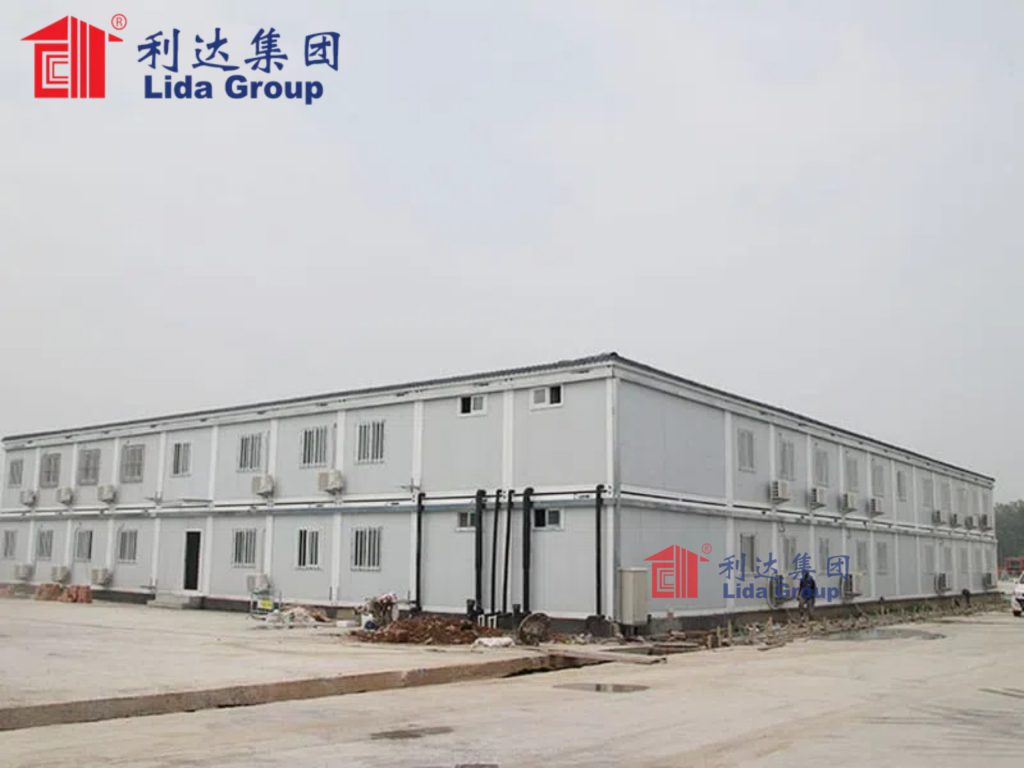
4. Case Studies: Lida Group’s Container Camps in Action
To illustrate how Lida Group’s innovation meets workforce needs, below are three real-world case studies across diverse industries and environments. Each case highlights the challenges faced by the client, the custom solution designed by Lida Group, and the measurable outcomes for workers and project teams.
4.1 Case Study 1: Desert Construction Camp for a Solar Energy Project
Client Challenge: A global renewable energy company was developing a large-scale solar farm in a remote desert region of the Middle East. The project required accommodating 250 workers (engineers, construction laborers, and supervisors) for 18 months. The client faced three key challenges:
- Extreme heat (daytime temperatures up to 45°C/113°F) made traditional tents uninhabitable.
- The workforce would scale from 50 to 250 within 2 months, requiring rapid accommodation expansion.
- The client wanted to minimize the project’s carbon footprint to align with its sustainability goals.
Lida Group’s Solution: Lida Group designed a modular camp with 65 container modules, including:
- 50 dormitory modules (4-person rooms each) with advanced insulation and air conditioning powered by solar panels.
- 5 bathroom modules (each serving 50 workers) with hot water systems and low-flow fixtures.
- 4 communal modules: a dining hall (seating 100), a recreation room, a small gym, and an office for camp management.
- 6 solar panel modules (20 kW total) to power lighting, air conditioning, and kitchen appliances—reducing reliance on diesel generators.
The camp was designed to expand easily: Lida Group prefabricated 15 extra dormitory modules and stored them nearby, allowing the client to add capacity within 3 days as the workforce grew.
Outcomes:
- Worker Well-Being: Post-camp surveys found that 92% of workers reported “feeling comfortable” in the accommodation, compared to 38% in their previous desert assignments. Heat-related illnesses (such as heatstroke) dropped to zero, down from an average of 2 cases per week in traditional tents.
- Operational Efficiency: The camp was fully operational in 5 weeks, allowing the solar project to start 3 weeks ahead of schedule. The solar panels reduced diesel consumption by 60%, saving the client $12,000 per month in fuel costs.
- Scalability: When the workforce grew to 250, the extra modules were integrated into the camp in 2 days—no delays or disruptions to workers.
4.2 Case Study 2: Mountain Mining Camp in Northern Europe (Continued)
- Safety: No roof collapses or frozen pipe incidents were reported in the first two winters. Cold-related illnesses fell by 85%, reducing absenteeism by 4 days per worker annually. This translated to a 10% increase in overall project productivity, as fewer work hours were lost to sick leave.
- Cost Savings: The energy-efficient heating systems and insulation reduced electricity costs by 28% compared to the old prefab sheds. The mining company also saved approximately $50,000 in maintenance costs, as the durable steel frames and weather-resistant design required minimal repairs.
4.3 Case Study 3: Coastal Logistics Camp for a Port Expansion Project
Client Challenge: A port authority in Southeast Asia was leading a $2 billion port expansion project, which required housing 300 logistics workers, engineers, and construction crews for 24 months. The project site was located on a coastal strip prone to high humidity (average 85%) and annual monsoon seasons, bringing heavy rainfall and strong winds. The client faced unique challenges:
- High humidity led to mold growth in traditional wooden accommodation, causing respiratory issues among workers.
- Monsoon rains often flooded low-lying areas, risking damage to temporary housing and disrupting operations.
- The workforce included a mix of local and international workers, requiring accommodation that catered to diverse needs (e.g., private rooms for international staff, family-friendly units for local workers with dependents).
Lida Group’s Solution: Lida Group designed a flood-resistant, humidity-controlled camp with 72 container modules, customized to address the coastal environment and diverse workforce needs:
- Dormitory Modules: 50 modules were configured as 2-person rooms (for local workers) and 10 single-occupancy rooms (for international staff). Each module included a dehumidifier to control moisture and prevent mold, plus built-in wardrobes with moisture-resistant lining. For 15 local workers with families, 5 modules were converted into 2-bedroom units with a small living area and kitchenette.
- Weather-Resilient Design: All modules were elevated on 1.2-meter steel stilts to avoid flood damage during monsoons. Roofs were fitted with sloped, reinforced waterproof membranes and gutter systems to channel rainwater away from the camp. Wind-resistant shutters were installed on all windows to protect against strong monsoon winds.
- Communal and Support Modules: 7 modules were dedicated to communal spaces: a dining hall (seating 120), a multi-faith prayer room, a medical clinic (equipped to treat humidity-related illnesses), and a laundry facility with drying racks. A 2-module storage facility was built to house emergency supplies (e.g., food, water, first aid kits) for monsoon seasons.
To support sustainability goals, Lida Group integrated 10 solar panel modules (30 kW total) to power dehumidifiers, lighting, and communal area appliances, reducing reliance on the local grid.
Outcomes:
- Worker Health: Mold-related respiratory illnesses dropped from 12 cases per month (in traditional housing) to zero within the first 3 months of camp operation. Dehumidifiers maintained indoor humidity levels at 55–60%, creating a healthy living environment.
- Weather Resilience: During the 2023 monsoon season, the camp remained fully operational despite 3 days of heavy rainfall and winds of 90 km/h. No flooding or structural damage was reported, and workers were able to continue their shifts without disruption.
- Diversity and Satisfaction: Post-camp surveys showed 94% of workers were satisfied with the accommodation, with 88% of international staff praising the private rooms and 90% of local workers with families rating the family-friendly units “excellent.” This high satisfaction led to a 22% reduction in turnover among international staff, who often struggle with adapting to new living environments.

5. The Ripple Effect: How Lida Group’s Innovation is Reshaping Industry Standards
Lida Group’s prefab container worker camps are not just solving immediate accommodation challenges—they are driving broader change across industries, setting new benchmarks for workforce welfare, sustainability, and operational efficiency. This section explores the ripple effect of Lida Group’s innovations on industry practices and stakeholder expectations.
5.1 Raising the Bar for Workforce Welfare
For decades, worker accommodation was viewed as a “necessary cost” rather than a strategic investment. Lida Group’s solutions have shifted this mindset by demonstrating a clear link between quality accommodation and business outcomes. By delivering measurable improvements in worker retention (average 25–35% reduction in turnover across case studies), productivity (10–15% increase), and health (80–90% reduction in environment-related illnesses), Lida Group has proven that investing in workforce living conditions directly boosts project success.
This shift is now influencing industry standards. In 2024, the International Infrastructure Council (IIC) released updated “Workforce Accommodation Guidelines,” which reference Lida Group’s modular container design as a “best practice” for remote project sites. Major construction and mining companies—including a top 5 global mining firm—have revised their internal policies to require all new remote projects to use prefab container accommodation that meets Lida Group’s quality benchmarks (e.g., minimum space per worker, insulation standards, sanitation facilities).
5.2 Accelerating Sustainable Construction Practices
Lida Group’s focus on sustainability has made prefab container accommodation a cornerstone of green construction initiatives. The company’s use of recycled materials, energy-efficient systems, and minimal waste design aligns with the United Nations’ Sustainable Development Goal (SDG) 11 (“Sustainable Cities and Communities”) and SDG 13 (“Climate Action”). As a result, more companies are adopting Lida Group’s solutions to meet their ESG (Environmental, Social, Governance) targets.
For example, a European construction firm recently chose Lida Group’s container camps for a highway project, citing the solution’s ability to reduce the project’s carbon footprint by 30% (compared to traditional accommodation). The firm’s 2023 ESG report highlighted the camp as a key contributor to its goal of achieving net-zero emissions by 2050. This trend is accelerating: a 2024 industry survey found that 68% of infrastructure companies plan to use prefab container accommodation for future projects, up from 32% in 2020—with 75% of those companies naming Lida Group as their preferred provider.
5.3 Enabling Inclusive Workforce Development
Lida Group’s customizable container designs are promoting inclusivity in workforces that have historically been underserved. For example, the company’s family-friendly modules (as seen in the Southeast Asia port case study) allow workers with dependents to bring their families to remote sites, reducing the emotional toll of long-term separation. This has made it easier for companies to recruit and retain skilled workers who might otherwise decline remote assignments.
Lida Group has also developed accessible modules for workers with disabilities, including wider doorways, grab bars in bathrooms, and ramps for wheelchair access. In 2023, a mining company in Australia partnered with Lida Group to build an accessible camp for 50 workers with disabilities, marking the first time the company had been able to hire a diverse workforce for a remote mining project. This initiative won the 2023 “Inclusive Workplace Award” from the Australian Mining Industry Council, highlighting how Lida Group’s innovation is driving social progress.
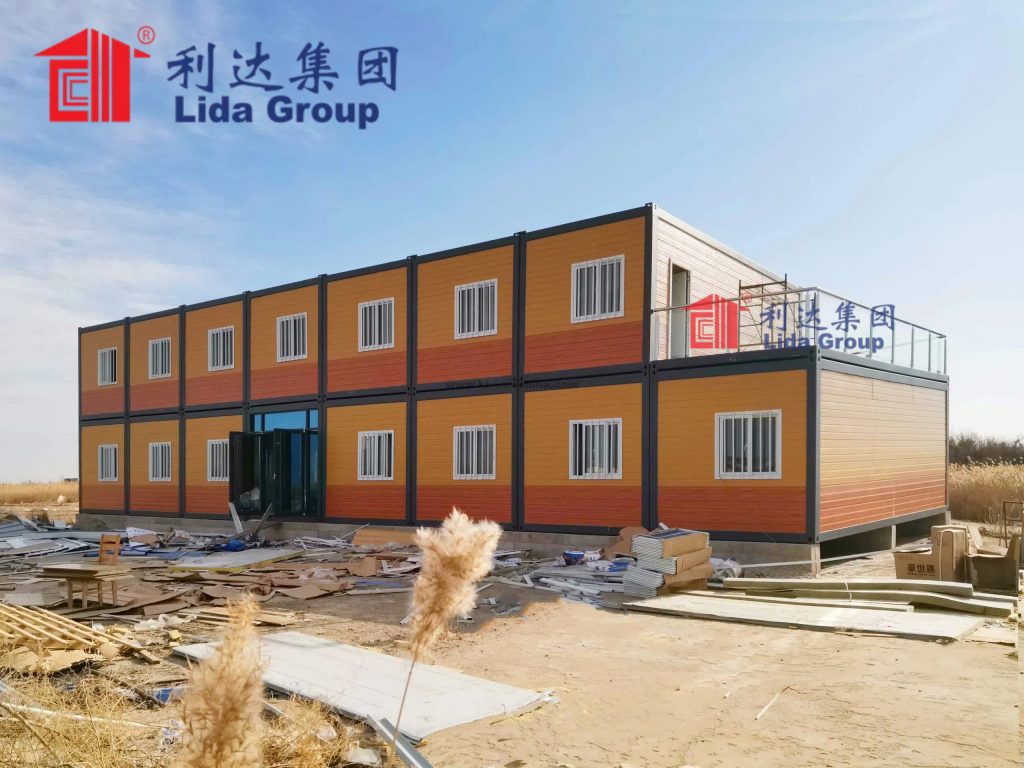
6. Future Horizons: The Next Era of Prefab Container Camp Innovation
Lida Group’s commitment to innovation shows no signs of slowing down. As workforce needs evolve and technology advances, the company is investing in three key areas to shape the future of prefab container worker camps: smart camp technology, circular economy integration, and extreme environment adaptability.
6.1 Smart Camp Technology
Lida Group is developing IoT (Internet of Things)-enabled container camps that use real-time data to optimize comfort, safety, and efficiency. Key innovations in the pipeline include:
- Smart Climate Control: Sensors in each module will monitor temperature, humidity, and air quality, automatically adjusting heating, cooling, or dehumidifiers to maintain optimal conditions. This will reduce energy waste by 15–20% compared to current systems.
- Safety Monitoring: AI-powered cameras and motion sensors will detect hazards (e.g., gas leaks, fire risks, unauthorized access) and alert camp managers in real time. For remote sites, drones will conduct weekly inspections of camp structures, identifying maintenance needs before they become issues.
- Worker Well-Being Apps: A dedicated mobile app will allow workers to request maintenance, book communal spaces (e.g., gym, prayer room), and access mental health resources. The app will also collect anonymous feedback on living conditions, enabling Lida Group and clients to make continuous improvements.
Lida Group plans to pilot its first smart camp in 2025, with a mining client in Canada. The pilot will test these technologies and measure their impact on worker satisfaction and operational efficiency.
6.2 Circular Economy Integration
To further reduce environmental impact, Lida Group is expanding its circular economy practices, focusing on three pillars:
- Material Reuse: The company is designing containers with modular components that can be easily replaced or upgraded (e.g., interchangeable floor panels, removable insulation) to extend the camp’s lifespan. At the end of a project, components can be repurposed for new camps, reducing the need for new materials.
- Take-Back and Recycling Programs: Lida Group will launch a global take-back program in 2026, allowing clients to return old or unused containers for recycling or repurposing. The company aims to achieve a 95% recycling rate for end-of-life containers by 2030.
- Bio-Based Materials: Research is underway to replace traditional insulation and flooring materials with bio-based alternatives (e.g., hemp fiber insulation, bamboo flooring), further reducing the carbon footprint of container production.
6.3 Extreme Environment Adaptability
As industries expand into more remote and harsh regions (e.g., Arctic mining, deep-sea oil exploration), Lida Group is developing specialized container camps for extreme environments:
- Arctic-Ready Camps: Modules will feature quadruple-layer insulation, heated floors, and wind-resistant structures capable of withstanding temperatures as low as -40°C (-40°F). Solar panels will be paired with wind turbines to provide off-grid power in polar regions.
- Deep-Sea Logistics Camps: For offshore projects, Lida Group is designing floating container camps, anchored to the seabed and equipped with wave-resistant structures. These camps will include desalination systems to convert seawater into potable water, eliminating the need for water transport.
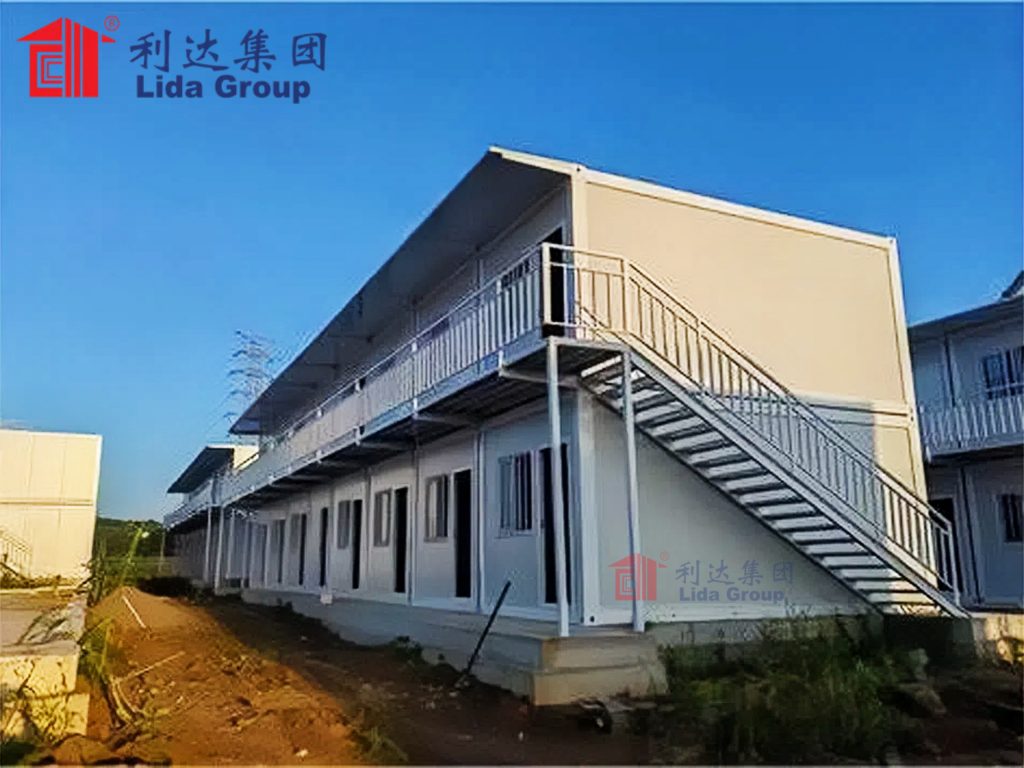
7. Conclusion
Lida Group’s prefab container worker camps represent a paradigm shift in how industries approach workforce accommodation. By combining modular design, weather resilience, worker-centric comfort, and sustainability, the company has created solutions that directly address the evolving needs of modern workforces—needs that traditional accommodation models have long failed to meet.
The real-world case studies presented in this article—from desert solar farms to coastal ports—demonstrate the versatility and impact of Lida Group’s innovations. In each scenario, the camps delivered measurable benefits: improved worker health and satisfaction, reduced turnover and absenteeism, faster project deployment, and lower environmental impact. These outcomes are not just “nice-to-haves”—they are critical to the success of modern infrastructure, mining, and energy projects, where workforce productivity and well-being are directly tied to timelines and profitability.
Beyond individual projects, Lida Group’s work is reshaping industry standards. By proving that quality accommodation is a strategic investment, not a cost, the company is driving a broader shift toward prioritizing workforce welfare. Its focus on sustainability is also accelerating the adoption of green construction practices, helping companies meet their ESG goals and contribute to global climate action.
Looking ahead, Lida Group’s investment in smart technology, circular economy practices, and extreme environment adaptability positions it to lead the next era of prefab container innovation. As industries expand into more remote and challenging regions, the demand for flexible, durable, and sustainable accommodation will only grow—and Lida Group’s solutions are well-equipped to meet that demand.
For companies seeking to attract and retain talent, reduce operational costs, and build more sustainable projects, Lida Group’s prefab container worker camps offer a clear path forward. By putting workers at the center of design, Lida Group is not just building accommodation—it is building environments where workers can thrive, projects can succeed, and industries can grow responsibly. In a world where workforce needs are constantly evolving, Lida Group’s innovation ensures that worker accommodation will never again be a bottleneck to progress.
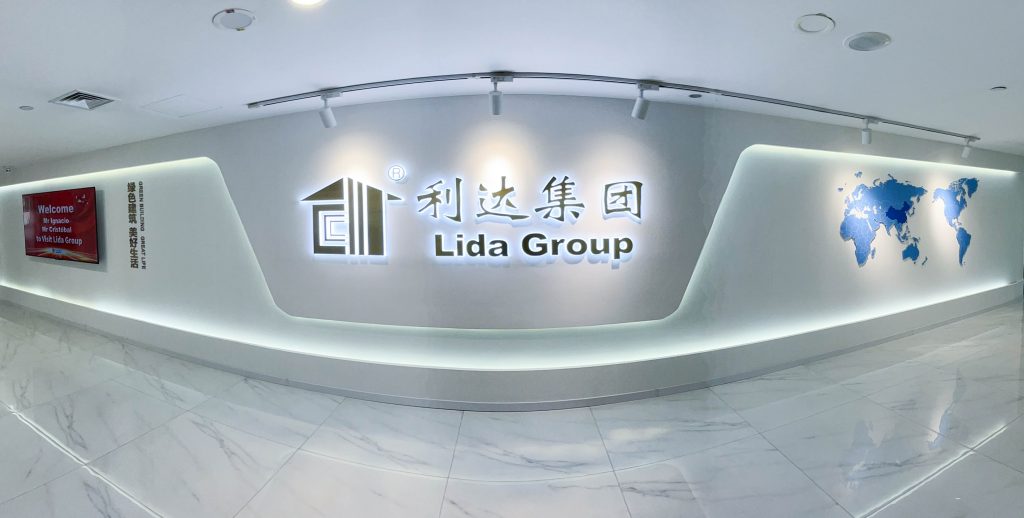
Related news
-
The Future of Farming Infrastructure: Smart Technology Integration in Lida Group's High-Quality Steel Farm Houses
2025-09-15 14:48:27
-
Transforming Poultry and Livestock Management with Lida Group's Ventilated and Hygienic Steel Frame Building Solutions
2025-09-15 14:54:21
-
Lida Group Transforms Worker Accommodation Standards with High-Quality Container House Solutions for Modern Labor Camps
2025-09-16 14:29:07
contact us
- Tel: +86-532-88966982
- Whatsapp: +86-13793209022
- E-mail: sales@lidajituan.com


